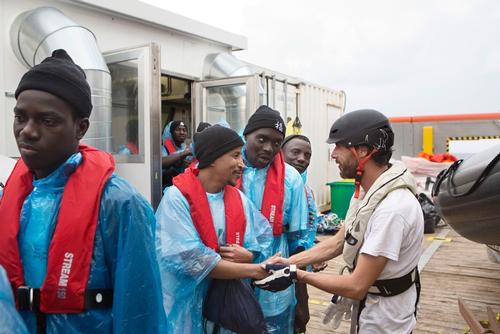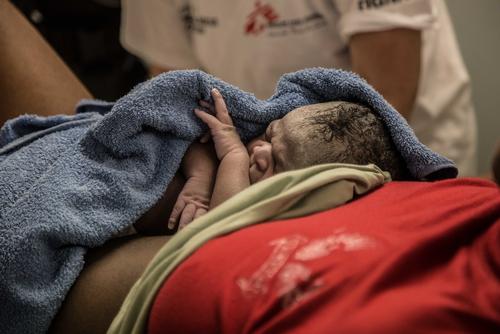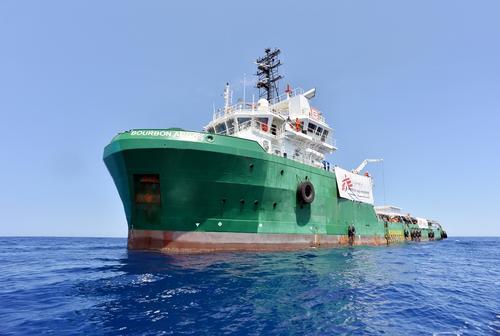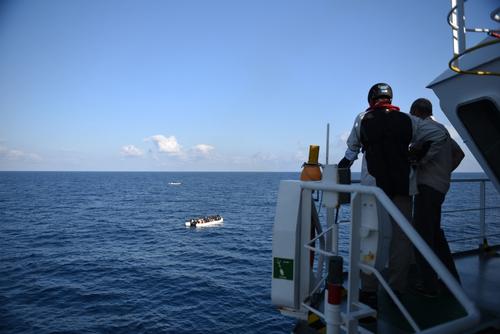Interview with Sebastian Stein, Bourbon Argos emergency coordinator
What situation are you expecting on the central Mediterranean in the coming months?
First of all, we expect fewer boats to leave the Libyan coast due to the weather and sea conditions, so the number of boats which find themselves in distress will be fewer. That said, when they do leave, we know that the conditions will be even more difficult. The waves will be bigger, the winds will be stronger and the temperatures will be lower than they were in the summer so whilst smugglers usually do not usually send boats when the weather is bad, sudden changes in weather occur often and could have dramatic and deadly consequences for those fleeing across the Mediterranean.
There is also the added complication of the constantly evolving European migration and refugee policies. Perhaps, after borders are closed across the Balkans, people will be forced to take the central Mediterranean route in increasing numbers. In the absence of safe and legal routes for people to flee war and seek asylum in Europe, we have to be ready for any eventuality.
Why are people crossing in the winter if it is more dangerous?
If last year is anything to go by, the price charged for crossing during winter is much lower than during summer. Smugglers will move people who have been in Libya for a long time but unable to pay the high rates of the summer months (or whose families have not come up with the extra cash despite attempts at extortion). This means that some of the most vulnerable migrants and refugees, those who’ve been hulled up in makeshift prisons in Libya for many months, without food and medical care will attempt the crossing during the winter.
To me, the fact that people willing to risk everything in winter conditions speaks to the gravity of the situation that they’re in. I cannot imagine the desperation that a parent faces putting their child in a boat in the calm summer months, let alone in the winter when the crossing is more deadly and infinitely more miserable. Ultimately, the most vulnerable will cross at the most dangerous time.
Is there a significant change in terms of medical needs?
The more immediate change is that, during the winter, there is a high likelihood that boats will capsize in rough seas and people will drown. Whilst in the summer dehydration is a killer, in the winter hypothermia will be of serious concern. When people get splashed with water in the summer it cools them down but in the winter this light spray of water can become life threatening. We will need to be prepared to treat many people with hypothermia at the same time. Of course, on the plus side, dehydration and sunburn will be less of a concern. We still expect to see the dreadful fuel burns that we have treated over the summer.
How will the physical rescues be different in the winter?
The waves get higher and the wind stronger so we will have to adapt our approach during the rescues. Small boats can really be thrown around by the sea so we need to be even more precise in our actions. Moreover, we could have people that are hypothermic when we rescue them, so we set up our medical system in order to be able to treat these people immediately.
How has the Bourbon Argos been prepared for the coming weeks?
We have changed the setup on the back deck of the boat to protect those rescued from the wind, rain and waves. Now, in a very different set up to the open deck of the summer, the containers are set up in U shape and we have raised the floor. People now have an indoor space to shelter in and we can now be sure that they can rest onboard the Bourbon Argos without getting wet, cold and hypothermic. We have also installed more storage space because we will need to distribute more blankets, hats, socks, and some other warm clothes than we did in the summer. It sounds simple but it can be lifesaving.
Will the care on board be any different?
We have started to provide warm food and cups of tea, as well as warm socks, hats, and other clothing along with the usual blankets to keep people warm. As they usually carry nothing but the clothes they wear, we’ll make sure people take warm clothes with them to help keep them warm once in Europe. Ultimately, in the winter as well as the summer, our role is not just to rescue people and provide them with medical care but to help them feel safe and well cared for, even if it is just for a few hours whilst they are on board our boat.
MSF launched the Bourbon Argos on 9 May to carry out search and rescue operations in the Mediterranean Sea. The ship has 29 people on board (of which 10 are MSF staff), including an experienced search and rescue team as well as MSF medical staff, water and sanitation experts, logisticians etc. The Bourbon Argos has the capacity to carry up to 450 rescued people to land inside an enclosed space that has been adapted to the new weather conditions. A new set up on the back deck of the boat protects those rescued from the wind, rain and waves. MSF teams provide warm clothes and warm meals. To date, the three MSF boats Bourbon Argos, Dignity I and My Phoenix have rescued a total of 18,447 people in the Central Mediterranean Sea since activities began in early May.






